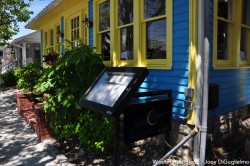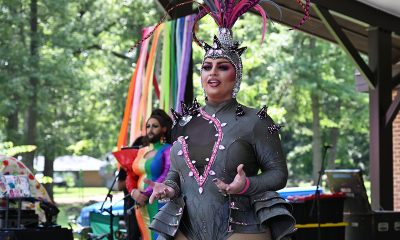Arts & Entertainment
Shakeups on the seashore
Summer brings parking changes, new restaurants and more to Rehoboth
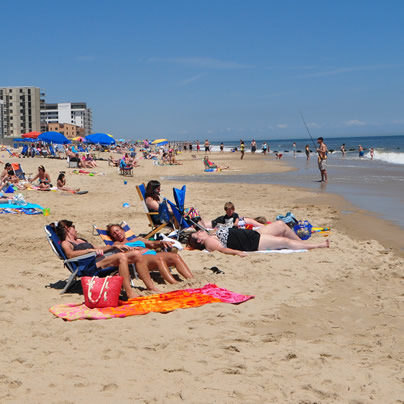
Even though Rehoboth Beach is consistently rated by travel guides as one of the nation’s best and most popular LGBT resort towns, it does’t rest on its laurels. As with most years, this summer you will find a number of changes.
Tired of scrounging for quarters in order to park? Beginning May 25, drivers will be able to pay for parking spaces by phones and mobile devices using the Parkmobile system already employed in D.C.
“This will bring Rehoboth Beach into the 21st century, and I think it is a great convenience to the consumer,” says Joe Zuber, owner of Dos Locos.
The Board of Commissioners early this year agreed to change the regulations regarding restaurant and bar patios, writing new regulations to allow establishments with patios to remain open and serving food and drinks until 1 a.m. In September 2010, the city launched raids on establishments that had patios and arrested some owners of those establishments.
Rehoboth Beach has always had establishments that cater to its growing LGBT clientele. From the Blue Moon — now in its 31st year — to the soon-to-open Our Place (Henlopen Junction Mall, 715 Rehoboth Ave.), formerly the site of Nourish, which bills itself as a neighborhood bar that serves comfort food, there is a wide range of establishments to meet everybody’s needs.
Many establishments will offer live entertainment throughout the summer. The venerable Blue Moon (35 Baltimore Ave.), with its bright new back bar, will continue to host daily shows and Pamala Stanley will again perform from 6 to 8 p.m., from Sunday through Thursday beginning May 27. On Friday night, the Divas will perform their drag show from 9:45-11 p.m. and Saturdays at the same time will see Blue Moon Legends, a celebrity tribute show.
Many LGBT-owned establishments will host regular shows. In town, Aqua (57 Baltimore Ave.), with its scantily attired servers is a great place to be seen; the L Bar (622 Rehoboth Ave.) brings back Mandance on Saturday nights; and Dos Locos (208 Rehoboth Ave.), Cloud 9 (234 Rehoboth Ave.), Purple Parrot (134 Rehoboth Ave.) and Rigby’s (404 Rehoboth Ave.) will also host regular entertainment. Be sure to visit the Parrot’s Biergarten, where the Blade’s 2011 Best Rehoboth Bartender Jamie Romano holds court.
Sole, also on Baltimore Avenue is no more, and will be replaced by a new venture with an unusual name, (a)Muse, which will provide what they describe as locally grown modernized food. Other new additions include Cabo, a Mexican restaurant with rooftop bar and tequileria that replaces Porcini House on Wilmington Avenue; Nage (19730 Coastal Highway) is opening a gourmet deli next door called Root Gourmet. And next door to it will be a new Touch of Italy modeled on the Lewes location and featuring a sit-down restaurant.
There are many LGBT-owned restaurants in town, among them, MIXX, JAM, Eden, Finbar’s, Lori’s and Purple Parrot. And for ice cream you can go to Double Dippers on First Street, opposite of Nicola’s.
Lesbians have no shortage of options for going out. A popular lesbian-owned restaurant, the Seafood Shack (42 1/2 Baltimore Ave.) continues to serve fine food and offer great entertainment. Mikki Snyder-Hall, a resident of Rehoboth Beach notes that, “since 2003 there has been an increase in lesbian-friendly bars and restaurants.”
Among them are Rehoboth Ale House (15 Wilmington Ave.) and Charcoal Grill, which has moved from the same shopping center as Gelato Gal, to the Food Lion shopping center at the site of Zorba’s. Both Frogg Pond (First and Rehoboth Avenue) and Cloud 9 (234 Rehoboth Avenue) are praised by Snyder-Hall as being lesbian-friendly, and Saketumi on Route 1 is also known to have a lesbian following.
In addition to the many eating and drinking establishments, Rehoboth also has one of the few independent LGBT bookstores left in the United States, Proud Bookstore, which has moved to a larger location at the Village at the Sea Shops. Jocques LeClair, former manager of Rehoboth Lambda Rising, said his business “provides an outlet for those who visit Rehoboth who may come from areas that are less friendly to them.” He also promotes local authors and has provided book readings and promotions for LGBT writers. Shortly he hopes to begin a book club.
The only gay-owned coffee shop in town, the Coffee Mill (Rehoboth Mews, 127 Rehoboth Ave.) is celebrating its 20th anniversary. Hoda Kotb featured this establishment on the “Today” show and can be seen there on occasion. Expect to see events related to its anniversary.
CAMP Rehoboth (37 Baltimore Ave.) serves as a community center, with information on the LGBT community, a meeting hall and sponsor of several popular summer events. This year the Black and White Beach Ball returns on June 3, with an event to promote local artists. Christopher Peterson, a popular female impersonator, will return for one day only, as Judy Garland, July 28, to benefit CAMP Rehoboth. Earlier that day, Barbara Gittings Delaware Stonewall Democrats will hold its Summer Bash, this year featuring Delaware’s Attorney General, Joseph “Beau” Biden, III. It will be held at Mariachi’s on Wilmington Avenue. The event is called a must stop-by summer event for all of the state’s political leaders, and on July 6, GLSEN will hold a beach party at the CAMP Community Center.
On the second Saturday of each month there is an Art Walk, a tour of the numerous galleries in town. Most galleries have special events featuring numerous local and national artists. There are several other gay-owned galleries in town including Gallery 50 (50 Wilmington Ave.) and Phillip Morton (47 Baltimore Ave.).
Bin 66, a favorite wine shop has wine tastings on Friday evenings at its Rehoboth Avenue location and on Saturday evenings at its other location opposite Spring Lake on Route 1.
Rehoboth offers a wide range of activities, dining options and nightlife. Visit camprehoboth.com or rehobothfoodie.com for updated information.
a&e features
Visit Cambridge, a ‘beautiful secret’ on Maryland’s Eastern Shore
New organization promotes town’s welcoming vibe, LGBTQ inclusion

CAMBRIDGE, Md. — Driving through this scenic, historic town on Maryland’s Eastern Shore, you’ll be charmed by streets lined with unique shops, restaurants, and beautifully restored Victorian homes. You’ll also be struck by the number of LGBTQ Pride flags flying throughout the town.
The flags are a reassuring signal that everyone is welcome here, despite the town’s location in ruby red Dorchester County, which voted for Donald Trump over Kamala Harris by a lopsided margin. But don’t let that deter you from visiting. A new organization, Proudly Cambridge, is holding its debut Pride event this weekend, touting the town’s welcoming, inclusive culture.
“We stumbled on a beautiful secret and we wanted to help get the word out,” said James Lumalcuri of the effort to create Proudly Cambridge.
The organization celebrates diversity, enhances public spaces, and seeks to uplift all that Cambridge has to share, according to its mission statement, under the tagline “You Belong Here.”
The group has so far held informal movie nights and a picnic and garden party; the launch party is June 28 at the Cambridge Yacht Club, which will feature a Pride celebration and tea dance. The event’s 75 tickets sold out quickly and proceeds benefit DoCo Pride.
“Tickets went faster than we imagined and we’re bummed we can’t welcome everyone who wanted to come,” Lumalcuri said, adding that organizers plan to make “Cheers on the Choptank” an annual event with added capacity next year.
One of the group’s first projects was to distribute free Pride flags to anyone who requested one and the result is a visually striking display of a large number of flags flying all over town. Up next: Proudly Cambridge plans to roll out a program offering affirming businesses rainbow crab stickers to show their inclusiveness and LGBTQ support. The group also wants to engage with potential visitors and homebuyers.
“We want to spread the word outside of Cambridge — in D.C. and Baltimore — who don’t know about Cambridge,” Lumalcuri said. “We want them to come and know we are a safe haven. You can exist here and feel comfortable and supported by neighbors in a way that we didn’t anticipate when we moved here.”

Lumalcuri, 53, a federal government employee, and his husband, Lou Cardenas, 62, a Realtor, purchased a Victorian house in Cambridge in 2021 and embarked on an extensive renovation. The couple also owns a home in Adams Morgan in D.C.
“We saw the opportunity here and wanted to share it with others,” Cardenas said. “There’s lots of housing inventory in the $300-400,000 range … we’re not here to gentrify people out of town because a lot of these homes are just empty and need to be fixed up and we’re happy to be a part of that.”
Lumalcuri was talking with friends one Sunday last year at the gazebo (affectionately known as the “gayzebo” by locals) at the Yacht Club and the idea for Proudly Cambridge was born. The founding board members are Lumalcuri, Corey van Vlymen, Brian Orjuela, Lauren Mross, and Caleb Holland. The group is currently working toward forming a 501(c)3.
“We need visibility and support for those who need it,” Mross said. “We started making lists of what we wanted to do and the five of us ran with it. We started meeting weekly and solidified what we wanted to do.”
Mross, 50, a brand strategist and web designer, moved to Cambridge from Atlanta with her wife three years ago. They knew they wanted to be near the water and farther north and began researching their options when they discovered Cambridge.
“I had not heard of Cambridge but the location seemed perfect,” she said. “I pointed on a map and said this is where we’re going to move.”
The couple packed up, bought a camper trailer and parked it in different campsites but kept coming back to Cambridge.
“I didn’t know how right it was until we moved here,” she said. “It’s the most welcoming place … there’s an energy vortex here – how did so many cool, progressive people end up in one place?”
Corey van Vlymen and his husband live in D.C. and were looking for a second home. They considered Lost River, W.Va., but decided they preferred to be on the water.
“We looked at a map on both sides of the bay and came to Cambridge on a Saturday and bought a house that day,” said van Vlymen, 39, a senior scientist at Booz Allen Hamilton. They’ve owned in Cambridge for two years.
They were drawn to Cambridge due to its location on the water, the affordable housing inventory, and its proximity to D.C.; it’s about an hour and 20 minutes away.
Now, through the work of Proudly Cambridge, they hope to highlight the town’s many attributes to residents and visitors alike.
“Something we all agree on is there’s a perception problem for Cambridge and a lack of awareness,” van Vlymen said. “If you tell someone you’re going to Cambridge, chances are they think, ‘England or Massachusetts?’”
He cited the affordability and the opportunity to save older, historic homes as a big draw for buyers.
“It’s all about celebrating all the things that make Cambridge great,” Mross added. “Our monthly social events are joyful and celebratory.” A recent game night drew about 70 people.
She noted that the goal is not to gentrify the town and push longtime residents out, but to uplift all the people who are already there while welcoming new visitors and future residents.
They also noted that Proudly Cambridge does not seek to supplant existing Pride-focused organizations. Dorchester County Pride organizes countywide Pride events and Delmarva Pride was held in nearby Easton two weeks ago.
“We celebrate all diversity but are gay powered and gay led,” Mross noted.
To learn more about Proudly Cambridge, visit the group on Facebook and Instagram.
What to see and do
Cambridge, located 13 miles up the Choptank River from the Chesapeake Bay, has a population of roughly 15,000. It was settled in 1684 and named for the English university town in 1686. It is home to the Harriet Tubman Museum, mural, and monument. Its proximity to the Blackwater National Wildlife Refuge makes it a popular stop for birders, drawn to more than 27,000 acres of marshland dubbed “the Everglades of the north.”
The refuge is walkable, bikeable, and driveable, making it an accessible attraction for all. There are kayaking and biking tours through Blackwater Adventures (blackwateradventuresmd.com).
Back in town, take a stroll along the water and through historic downtown and admire the architecture. Take in the striking Harriet Tubman mural (424 Race St.). Shop in the many local boutiques, and don’t miss the gay-owned Shorelife Home and Gifts (421 Race St.), filled with stylish coastal décor items.
Stop for breakfast or lunch at Black Water Bakery (429 Race St.), which offers a full compliment of coffee drinks along with a build-your-own mimosa bar and a full menu of creative cocktails.
The Cambridge Yacht Club (1 Mill St.) is always bustling but you need to be a member to get in. Snapper’s on the water is temporarily closed for renovations. RaR Brewing (rarbrewing.com) is popular for craft beers served in an 80-year-old former pool hall and bowling alley. The menu offers burgers, wings, and other bar fare.
For dinner or wine, don’t miss the fantastic Vintage 414 (414 Race St.), which offers lunch, dinner, wine tasting events, specialty foods, and a large selection of wines. The homemade cheddar crackers, inventive flatbreads, and creative desserts (citrus olive oil cake, carrot cake trifle) were a hit on a recent visit.
Also nearby is Ava’s (305 High St.), a regional chain offering outstanding Italian dishes, pizzas, and more.
For something off the beaten path, visit Emily’s Produce (22143 Church Creek Rd.) for its nursery, produce, and prepared meals.
“Ten minutes into the sticks there’s a place called Emily’s Produce, where you can pay $5 and walk through a field and pick sunflowers, blueberries, you can feed the goats … and they have great food,” van Vlymen said.
As for accommodations, there’s the Hyatt Regency Chesapeake Bay (100 Heron Blvd. at Route 50), a resort complex with golf course, spa, and marina. Otherwise, check out Airbnb and VRBO for short-term rentals closer to downtown.
Its proximity to D.C. and Baltimore makes Cambridge an ideal weekend getaway. The large LGBTQ population is welcoming and they are happy to talk up their town and show you around.
“There’s a closeness among the neighbors that I wasn’t feeling in D.C.,” Lumalcuri said. “We look after each other.”
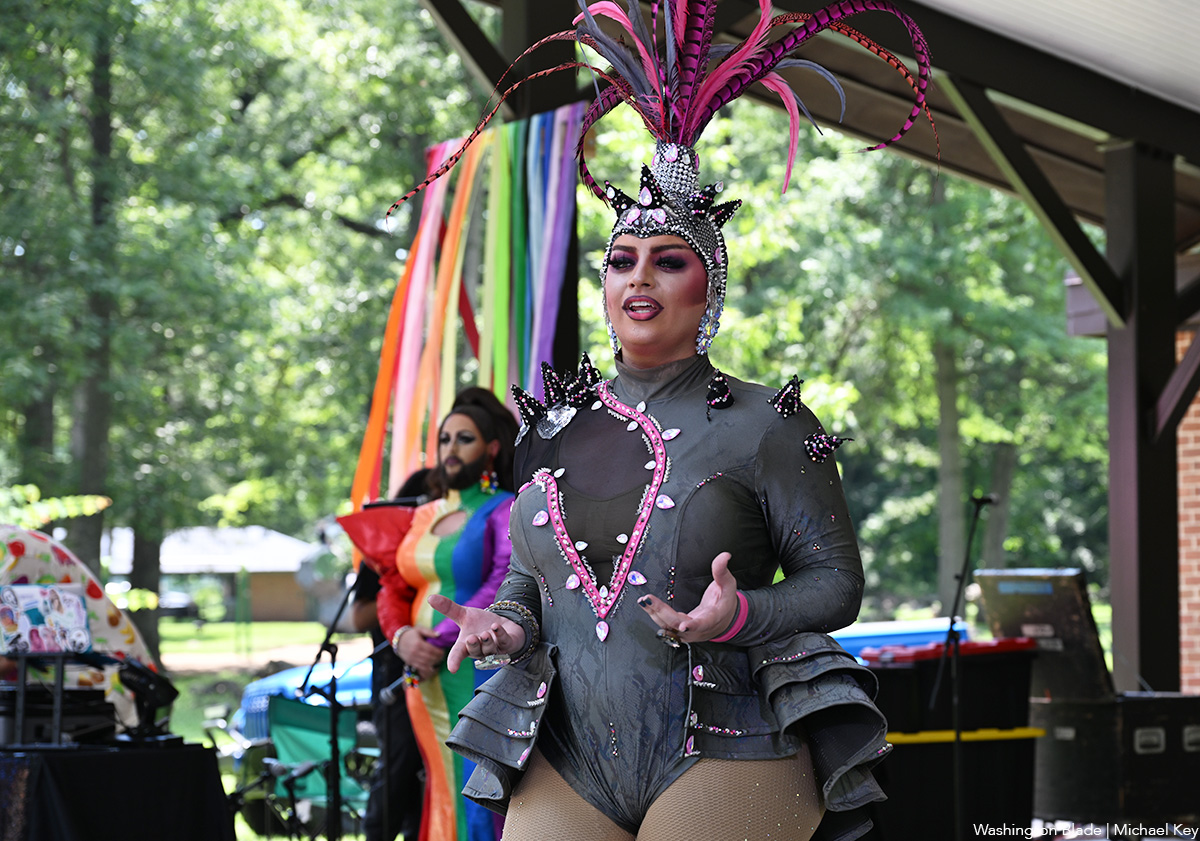
The 13th annual Hagerstown Pride Festival was held at Doubs Woods Park in Hagerstown, Md. on Saturday, June 21.
(Washington Blade photos by Michael Key)
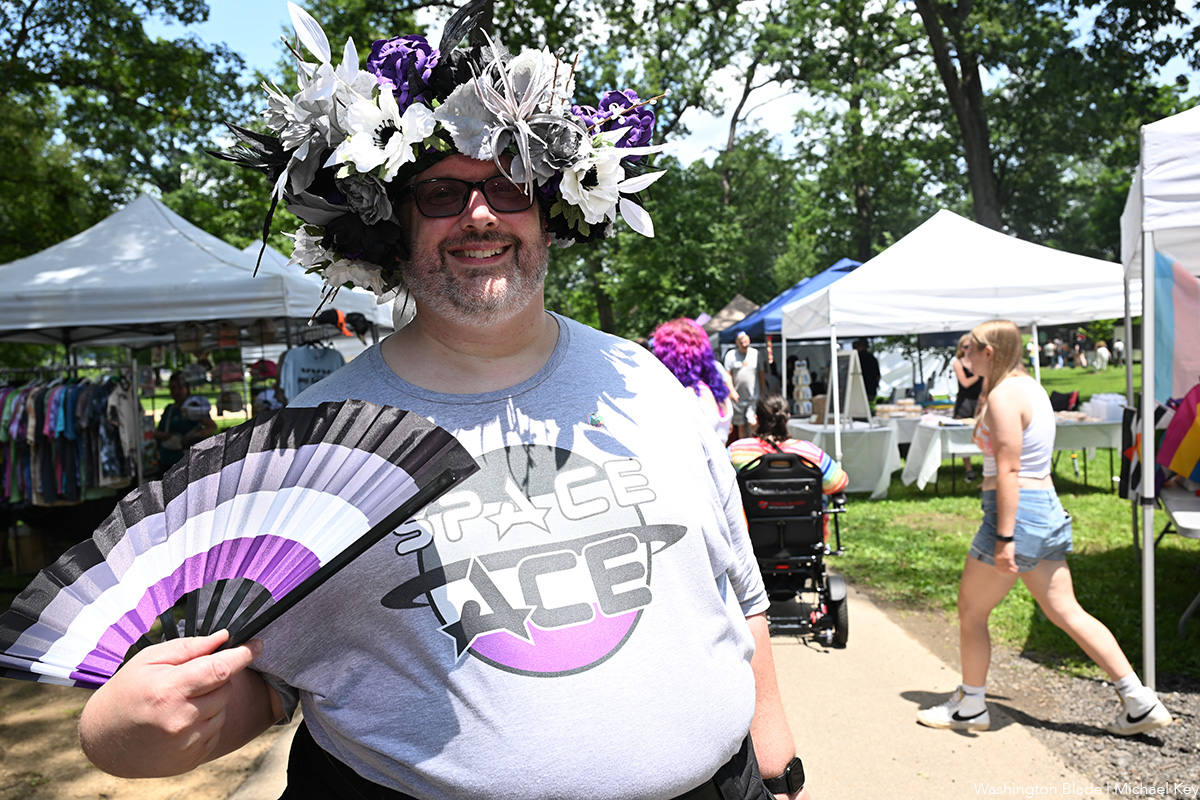
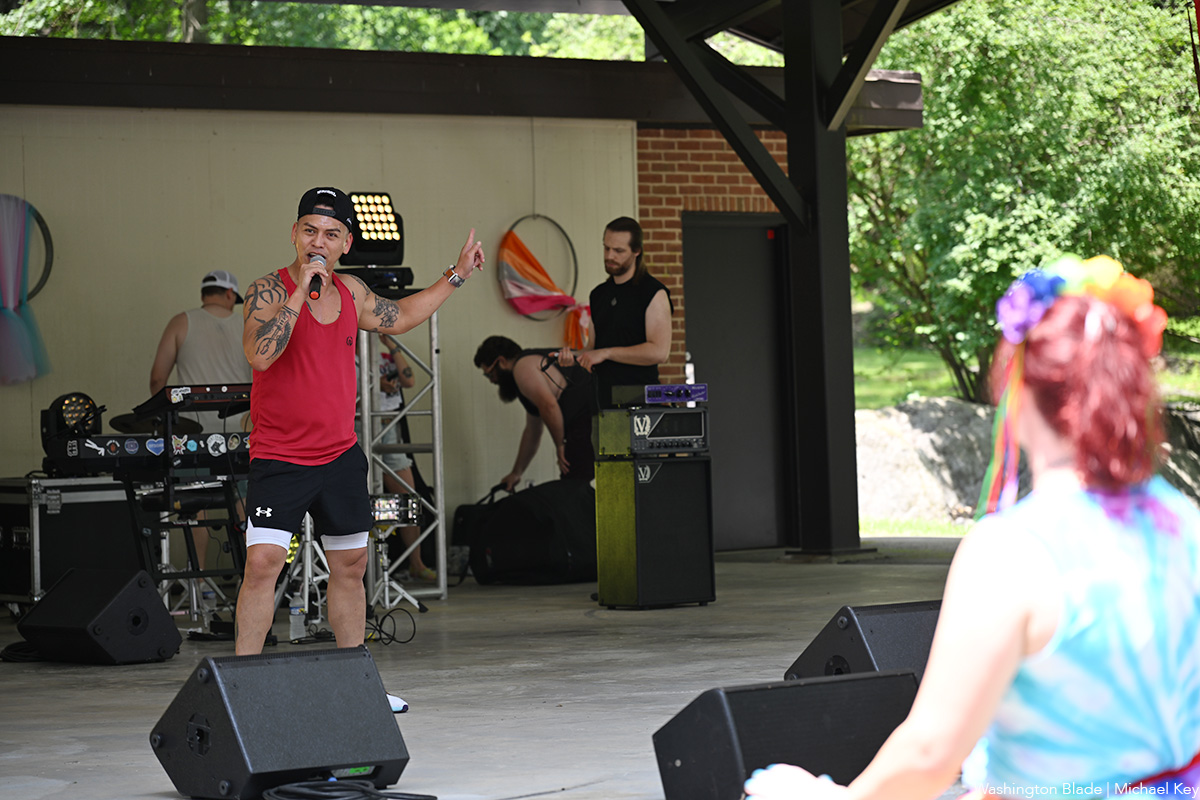
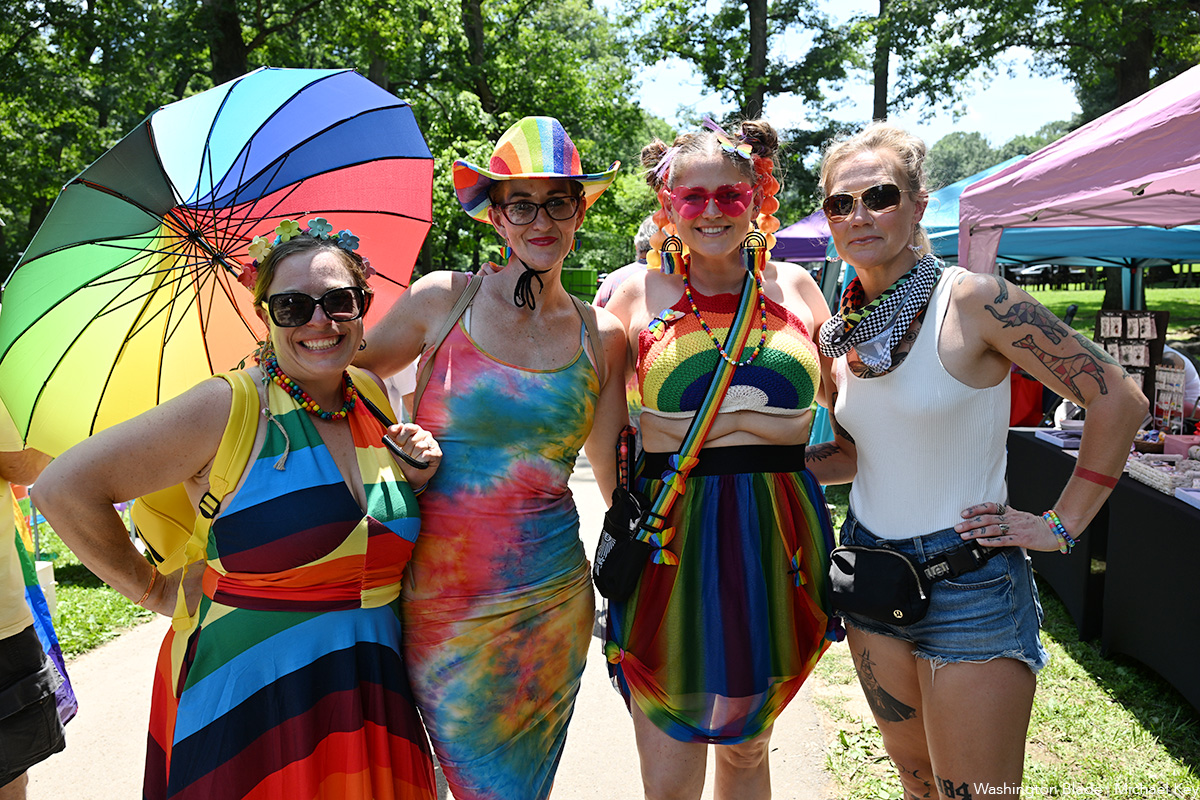

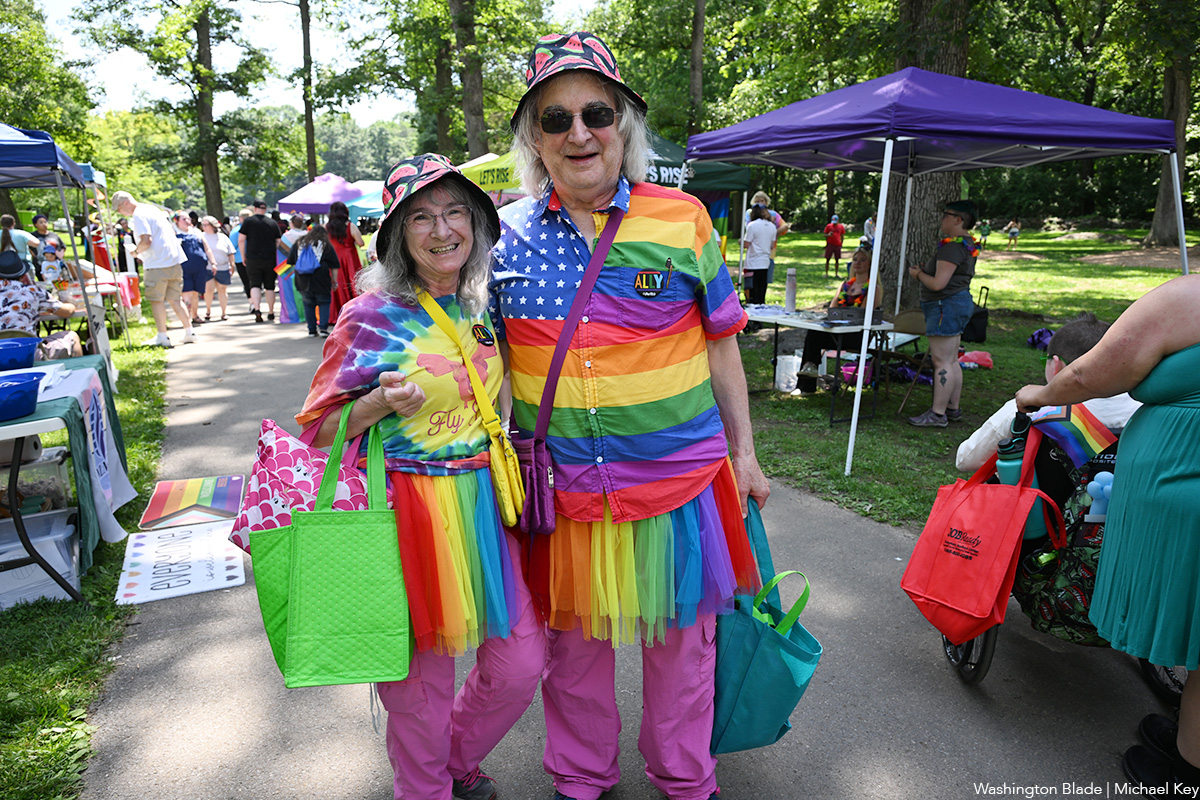
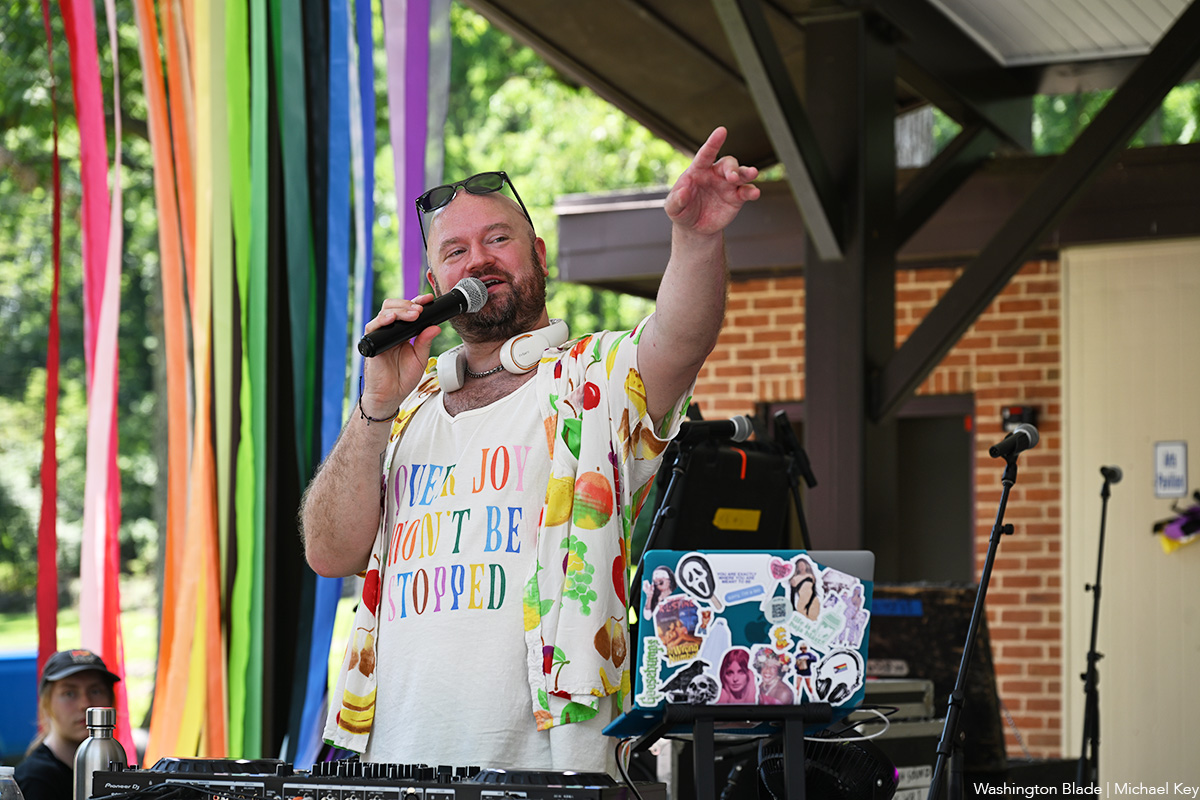
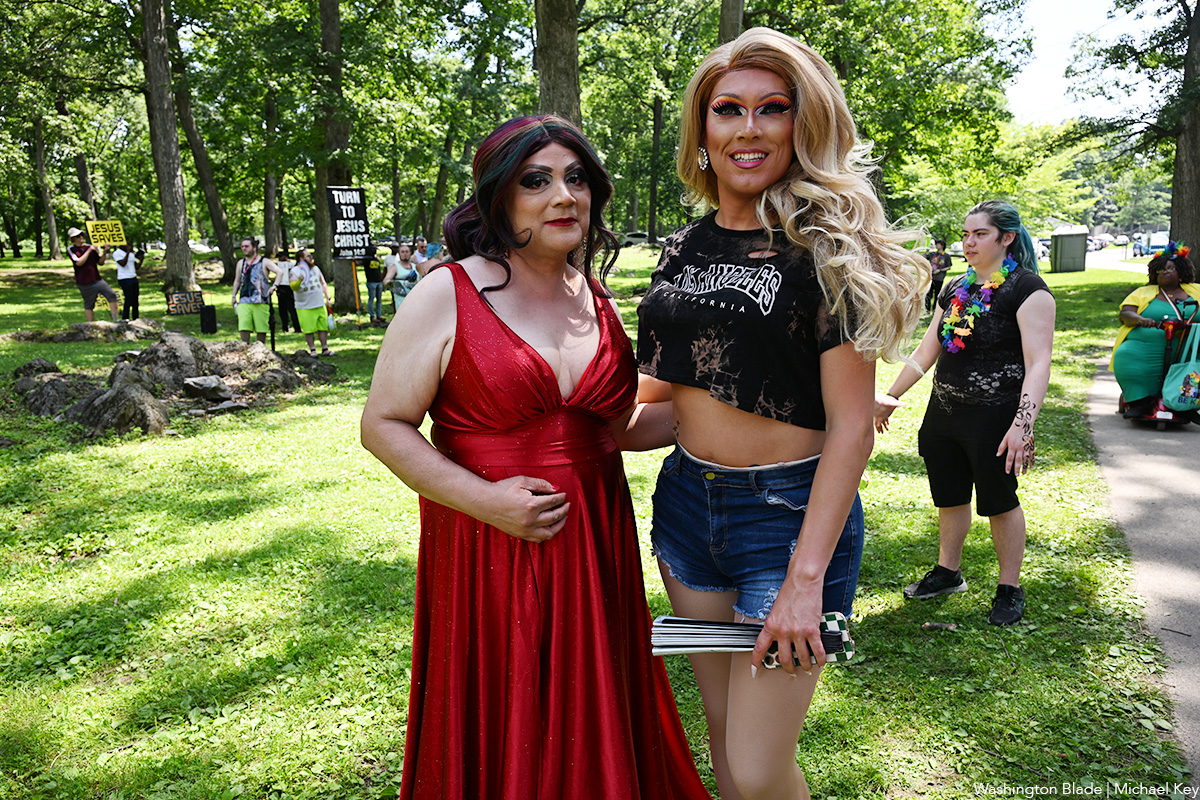
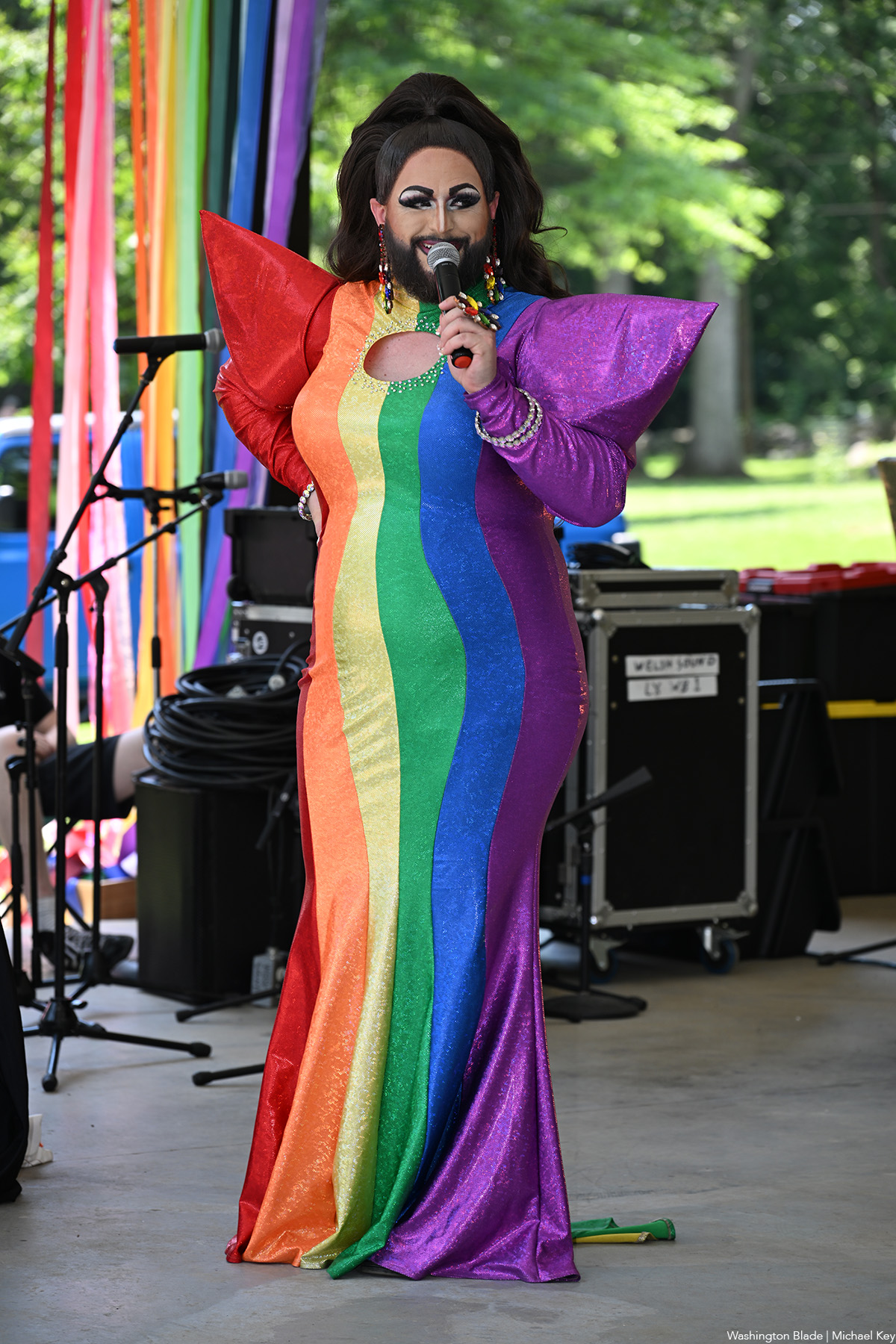
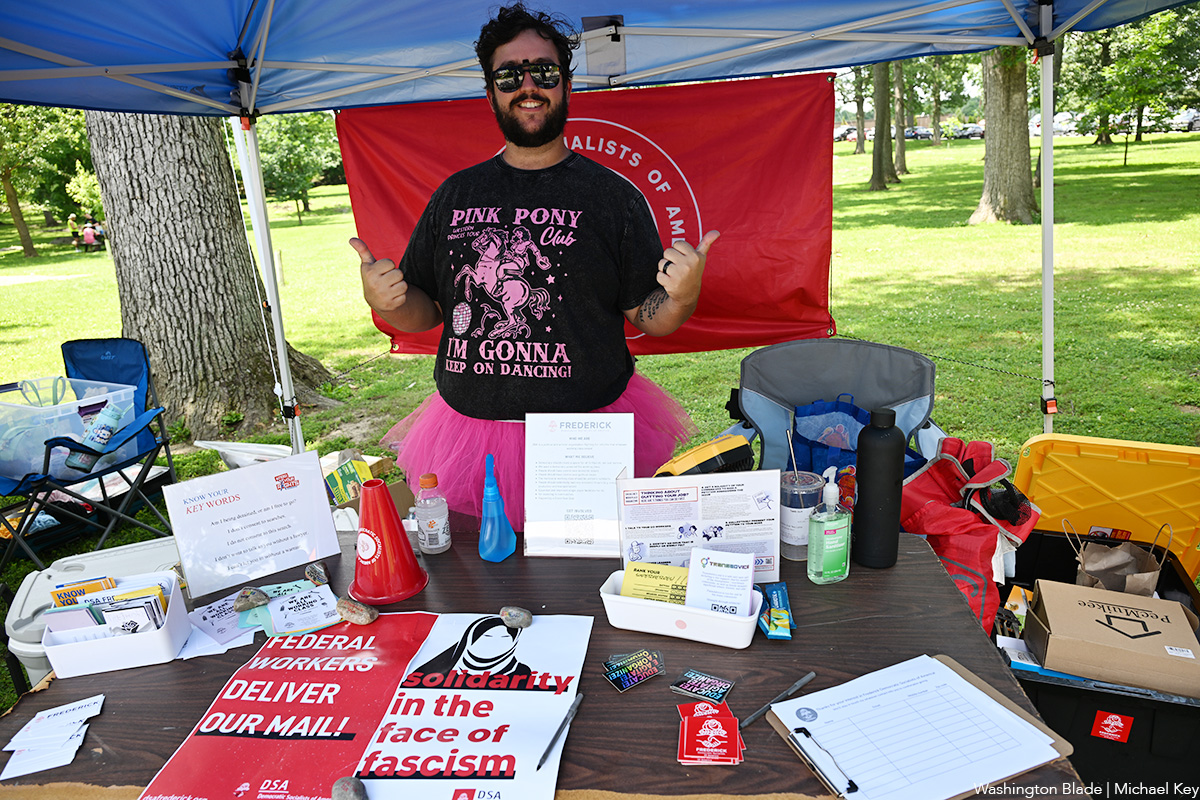

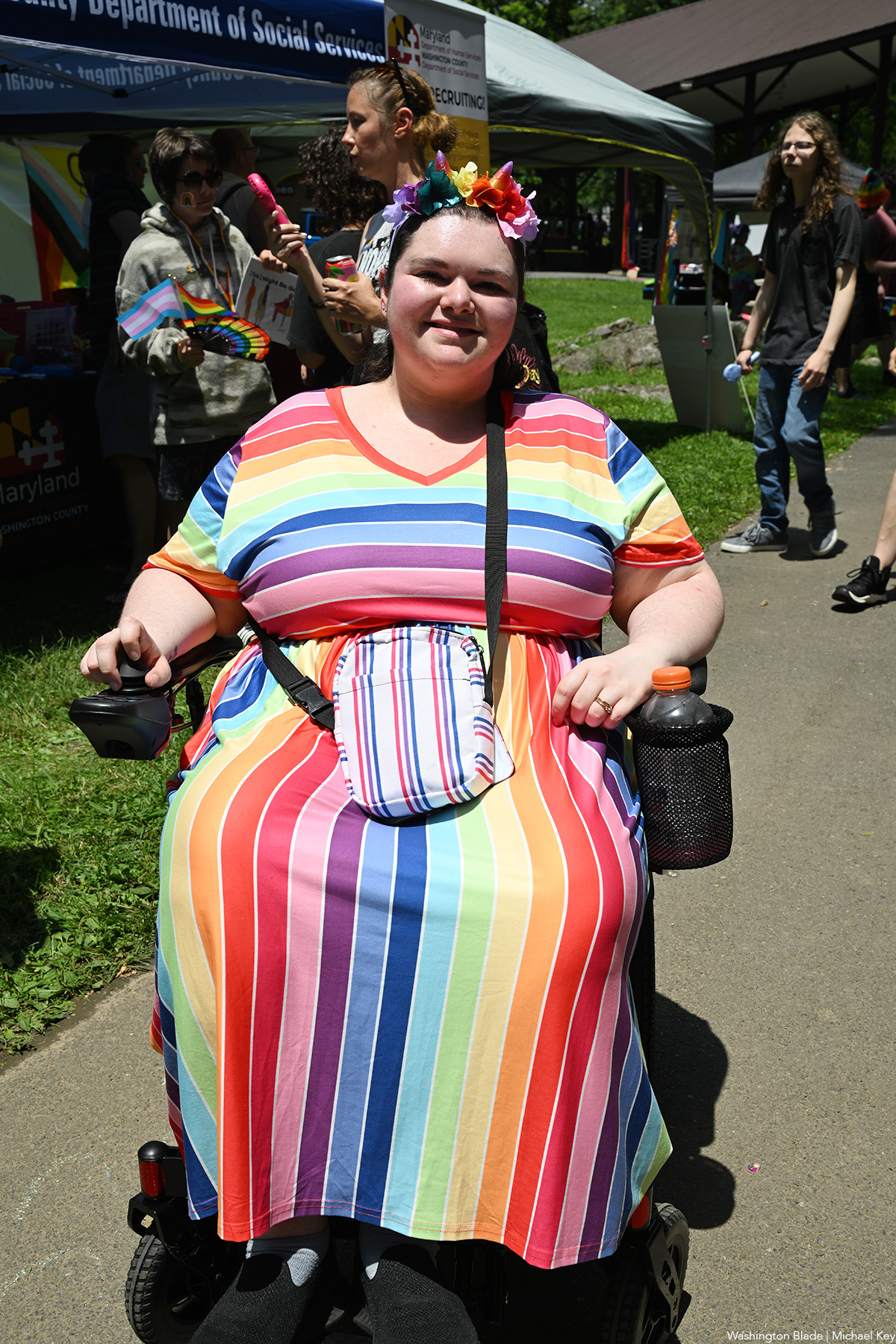
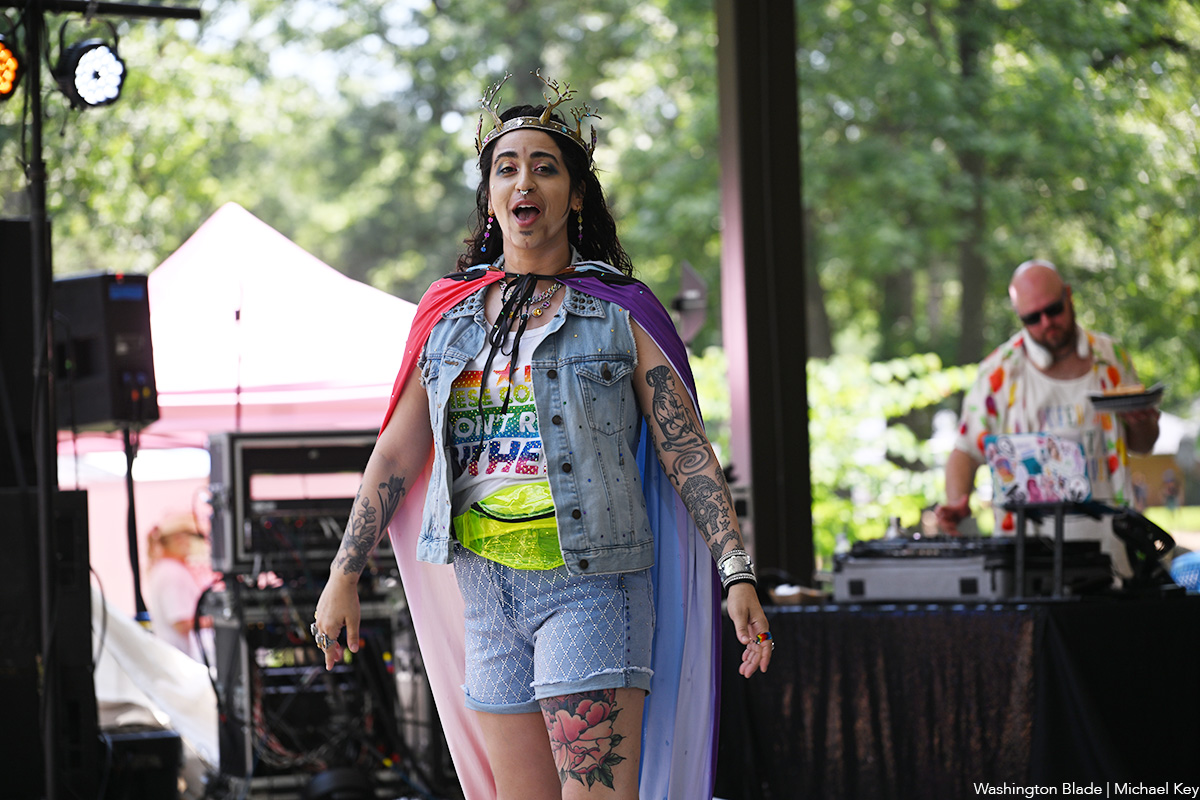
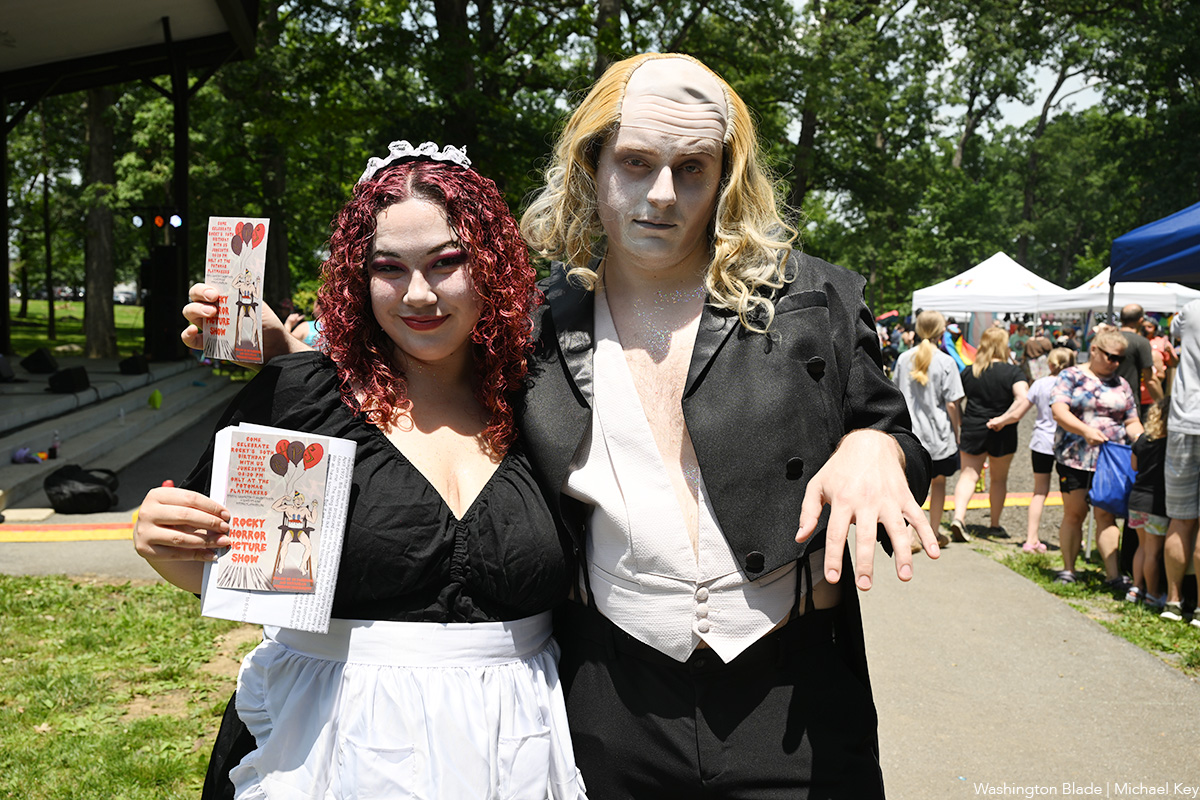
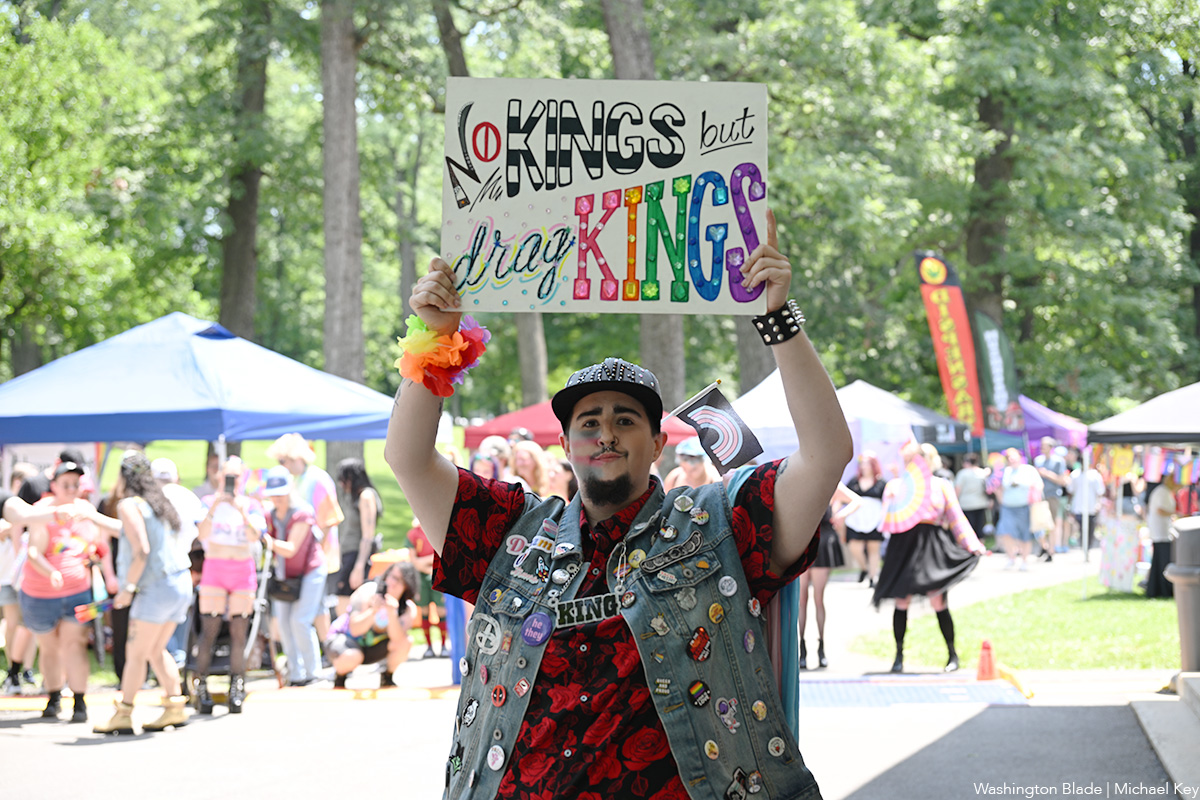
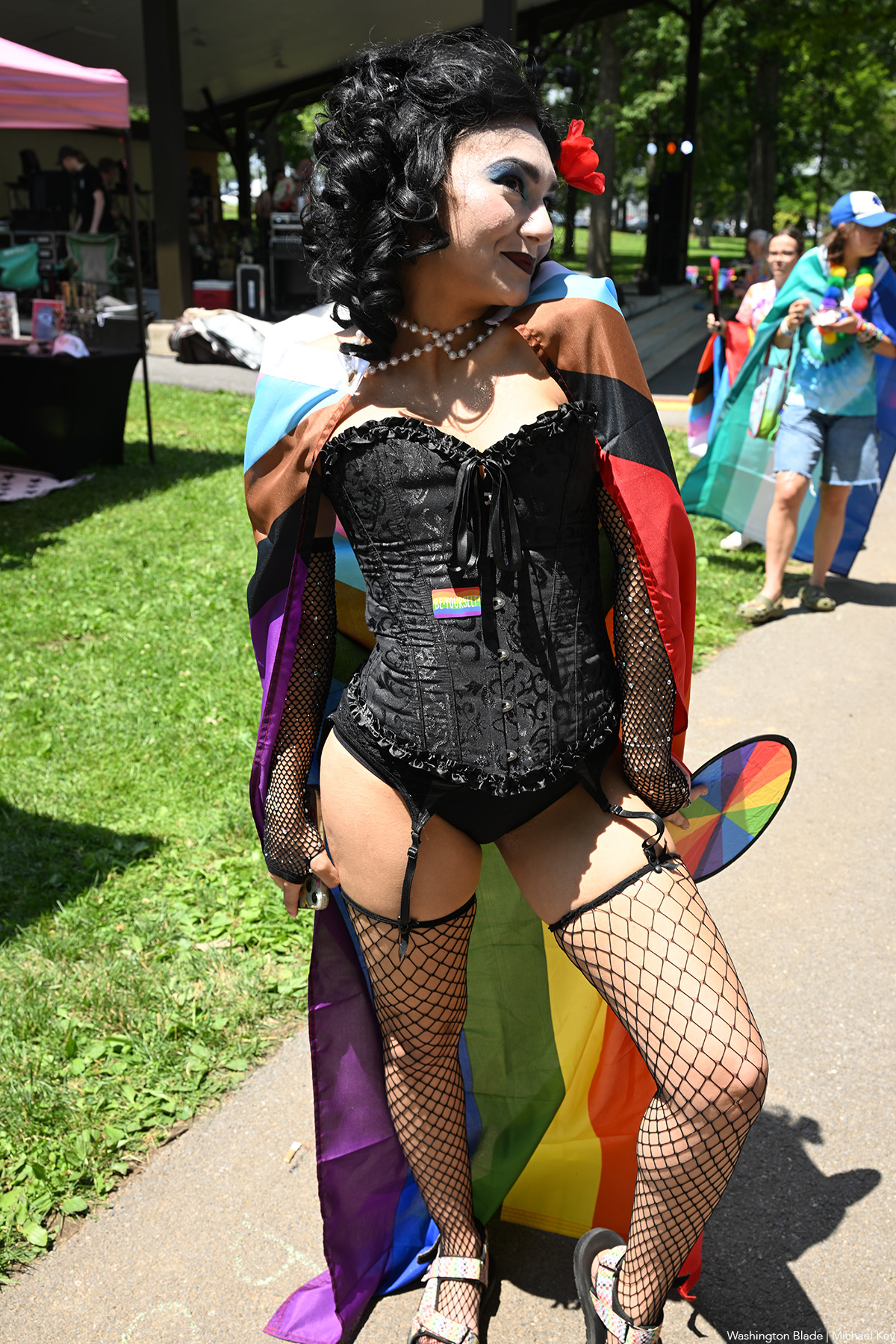

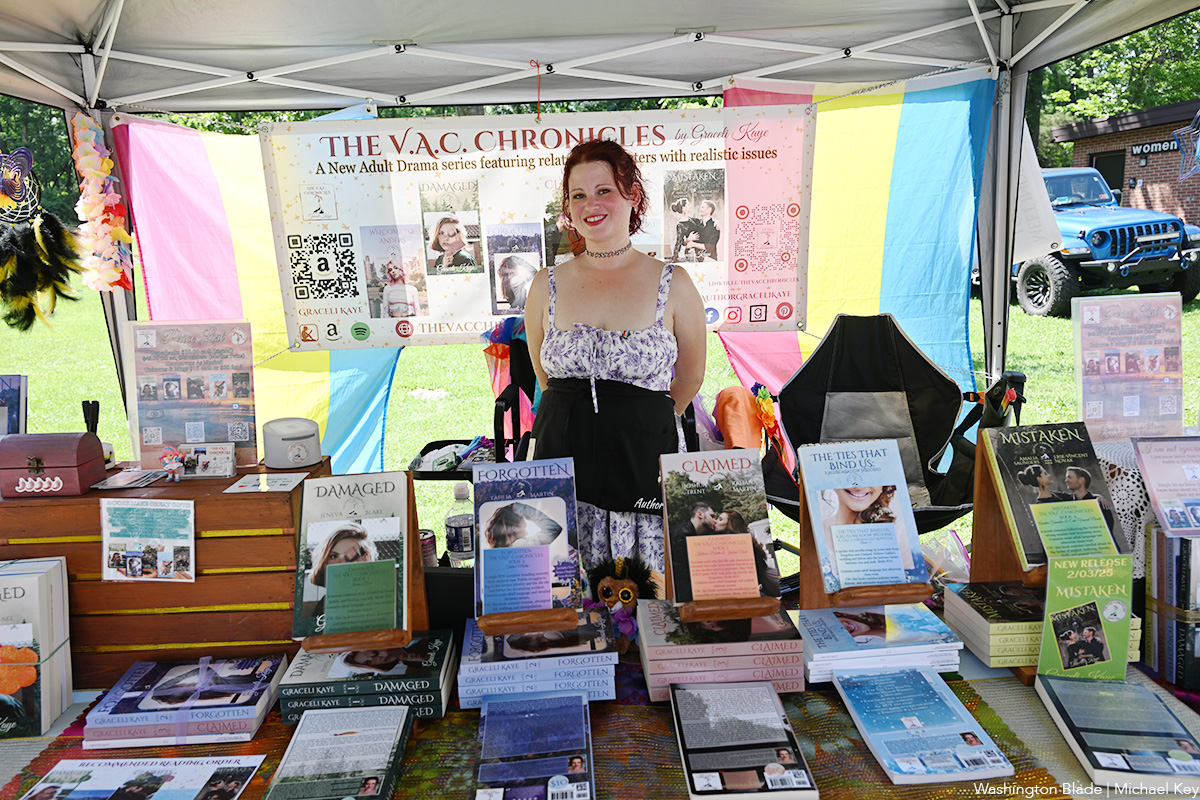
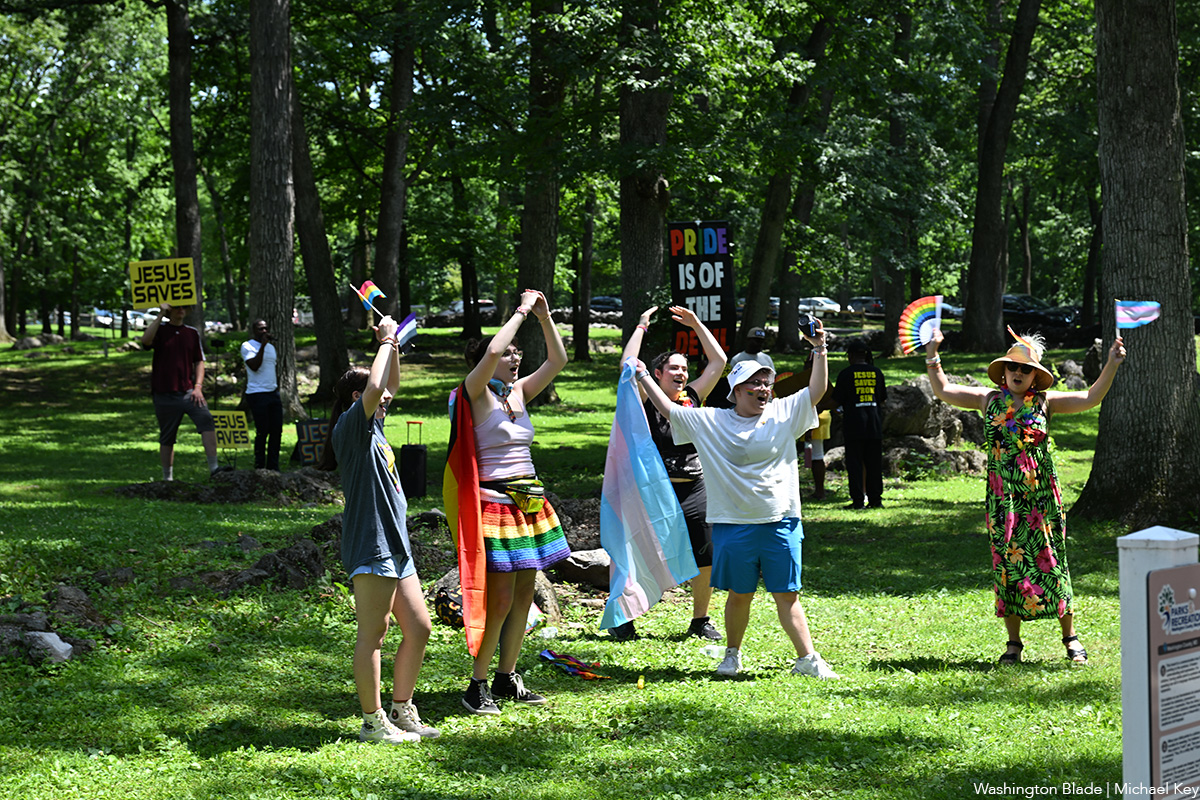
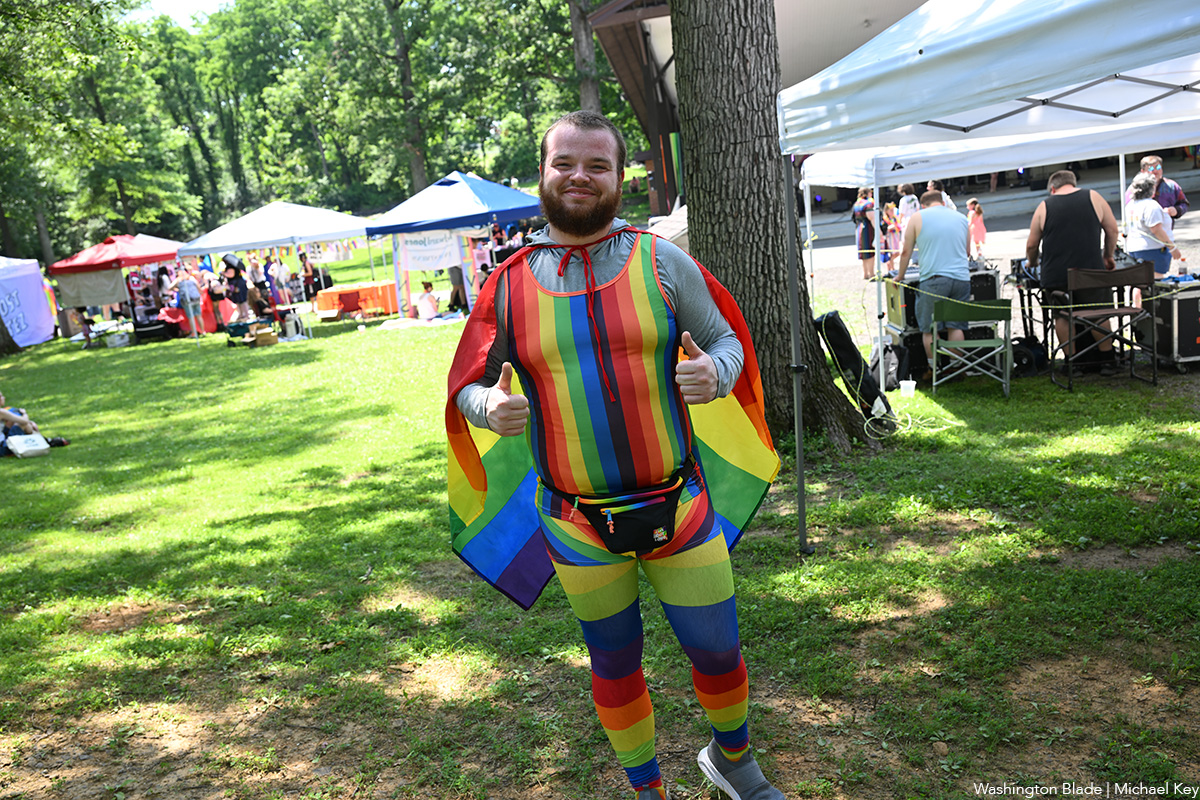
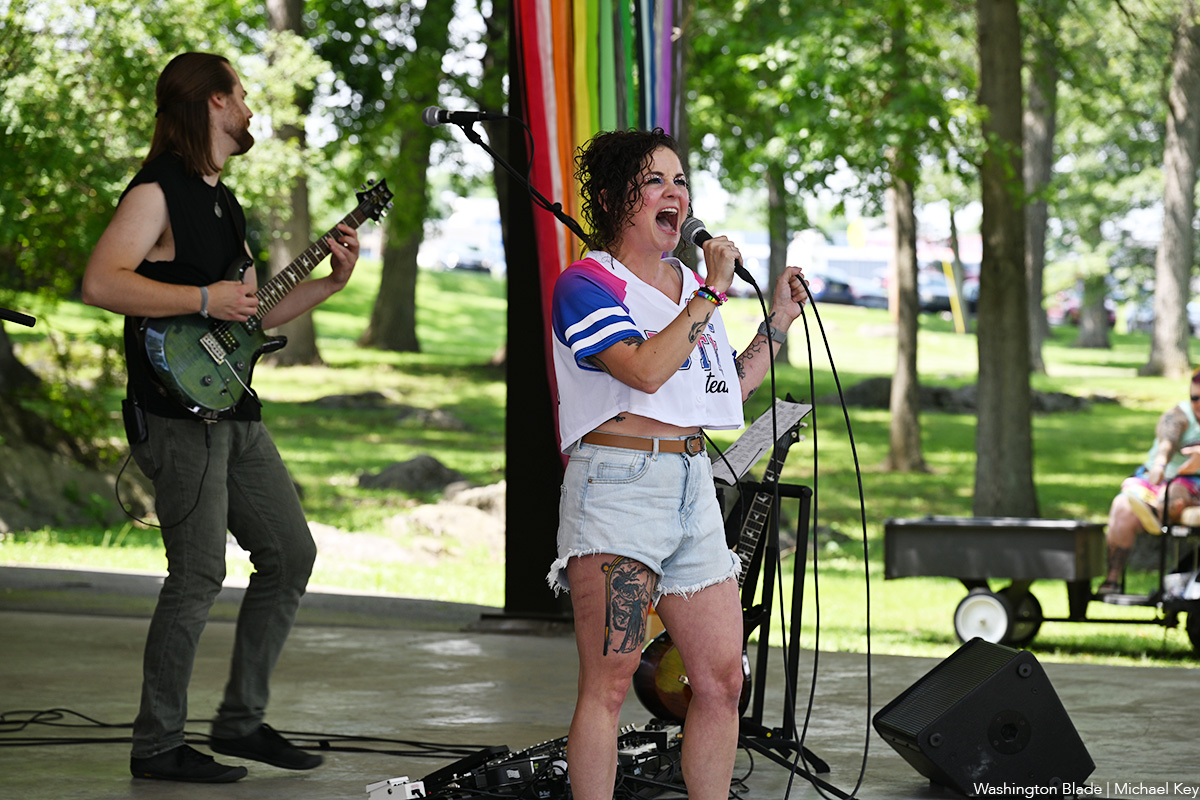
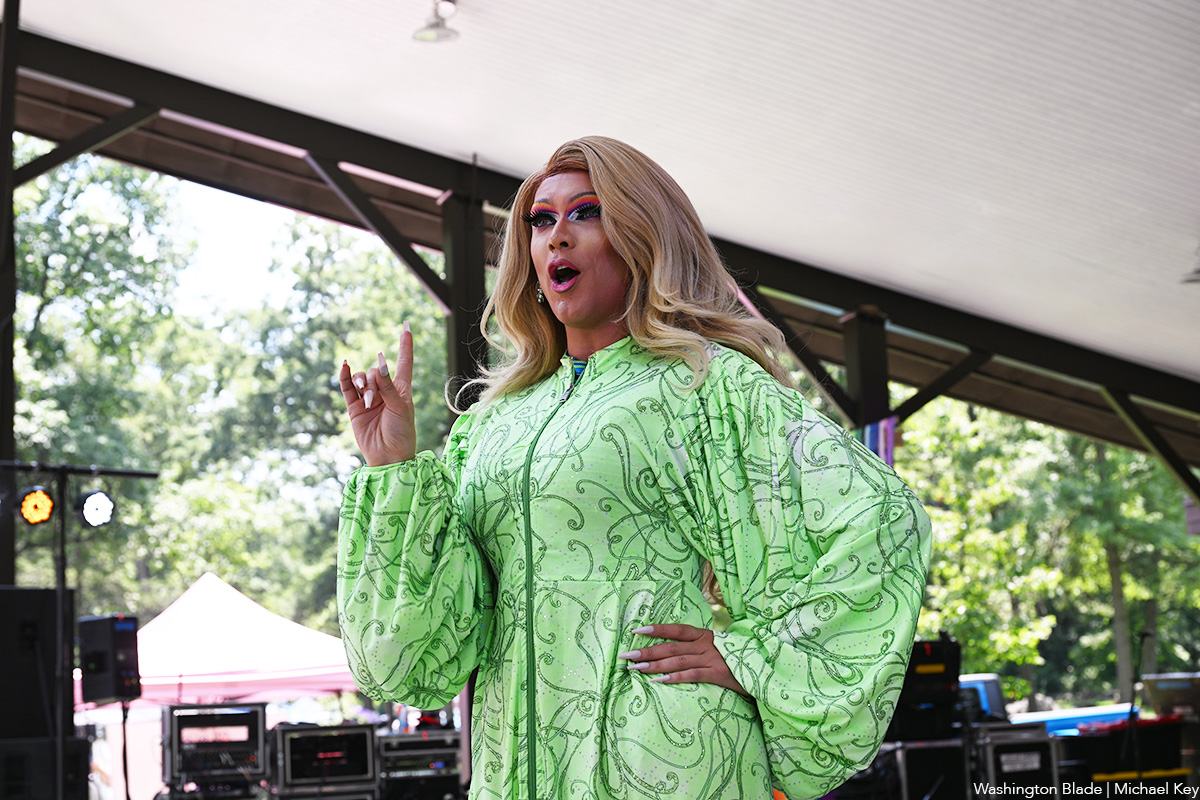
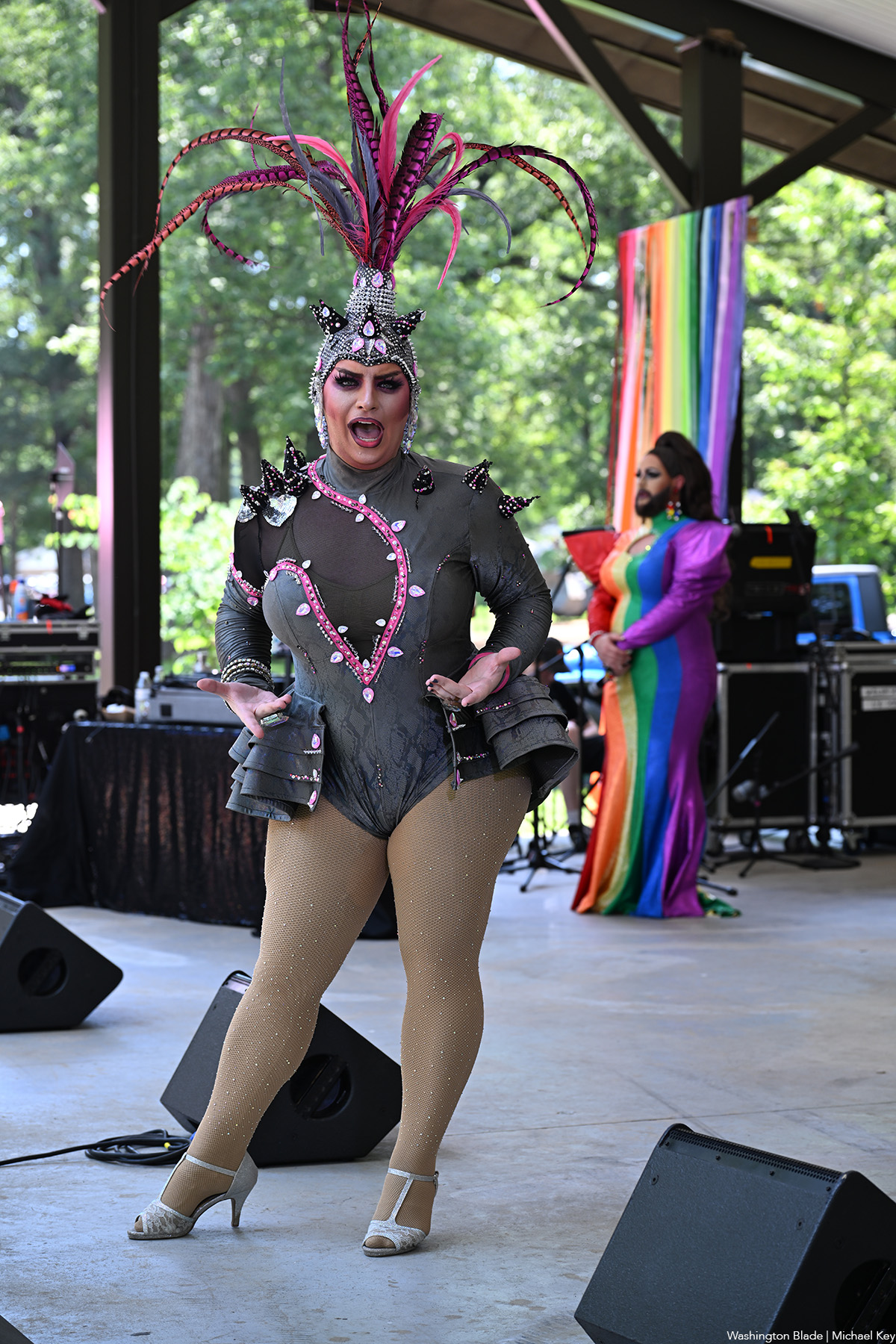
Theater
‘Hunter S. Thompson’ an unlikely but rewarding choice for musical theater
‘Speaks volumes about how sad things land on our country’

‘The Untitled Unauthorized Hunter S. Thompson Musical’
Through July 13
Signature Theatre
4200 Campbell Ave., Arlington, Va.
$47 to $98
Sigtheatre.org
The raucous world of the counterculture journalist may not seem the obvious choice for musical theater, but the positive buzz surrounding Signature Theatre’s production of Joe Iconis’s “The Untitled Unauthorized Hunter S. Thompson Musical” suggests otherwise.
As the titular, drug addled and gun-toting writer, Eric William Morris memorably moves toward his character’s suicide in 2005 at 67. He’s accompanied by an ensemble cast playing multiple roles including out actor George Salazar as Thompson’s sidekick Oscar “Zeta” Acosta, a bigger than life Mexican American attorney, author, and activist in the Chicano Movement who follows closely behind.
Salazar performs a show-stopping number — “The Song of the Brown Buffalo,” a rowdy and unforgettable musical dive into a man’s psyche.
“Playing the part of Oscar, I’m living my Dom daddy activist dreams. For years, I was cast as the best friend with a heart of gold. Quite differently, here, I’m tasked with embodying all the toxic masculinity of the late ‘60s, and a rampant homophobia, almost folded into the culture.”
He continues, “My sexuality aside, I like to think that Oscar would be thrilled by my interpretation of him in that song.
“Our upbringings are similar. I’m mixed race – Filipino and Ecuadorian and we grew up similarly,” says Salazar, 39. “He didn’t fit in as white or Mexican American, and fell somewhere in the middle. Playing Oscar [who also at 39 in 1974 forever disappeared in Mexico], I pulled out a lot of experience about having to code switch before finally finding myself and being confident just doing my own thing.
“As we meet Oscar in the show we find exactly where’s he’s at. Take me or leave me, I couldn’t care less.”
In 2011, just three years after earning his BFA in musical theater from the University of Florida in Gainesville, Salazar fortuitously met Iconis at a bar in New York. The pair became fast friends and collaborators: “This is our third production,” says George. “So, when Joe comes to me with an idea, there hasn’t been a moment that I don’t trust him.”
In “Be More Chill,” one of Iconis’s earlier works, Salazar originated the role of Michael Mell, a part that he counts as one of the greatest joys of artistic life.
With the character, a loyal and caring friend who isn’t explicitly queer but appeals to queer audiences, Salazar developed a fervent following. And for an actor who didn’t come out to his father until he was 30, being in a place to support the community, especially younger queer people, has proved incredibly special.
“When you hear Hunter and Oscar, you might think ‘dude musical,’ but I encourage all people to come see it.” Salazar continues, “Queer audiences should give the show a shot. As a musical, it’s entertaining, funny, serious, affecting, and beautiful. As a gay man stepping into this show, it’s so hetero and I wasn’t sure what to do. So, I took it upon myself that any of the multiple characters I play outside of Oscar, were going to be queer.
Queer friends have seen it and love it, says Salazar. His friend, Tony Award-winning director Sam Pinkleton (“Oh, Mary!”) saw Hunter S. Thompson at the La Jolla Playhouse during its run in California, and said it was the best musical he’d seen in a very long time.
“Since the work’s inception almost 10 years ago, I was the first Oscar to read the script. In the interim, the characters’ relationships have grown but otherwise there have been no major changes. Still, it feels more impactful in different ways: It’s exciting to come here to do the show especially since Hunter S. Thompson was very political.”
Salazar, who lives in Los Angeles with his partner, a criminal justice reporter for The Guardian, is enjoying his time here in D.C. “In a time when there are so many bans – books, drag queens, and travel — all I see is division. This is an escape from that.”
He describes the Hunter Thompson musical as Iconis’s masterpiece, adding that it’s the performance that he’s most proud of to date and that feels there a lot of maturity in the work.
“In the play, Thompson talks to Nixon about being a crook and a liar,” says Salazar. “The work speaks volumes about how sad things land on our country: We seem to take them one step forward and two steps back; the performance is almost art as protest.”

